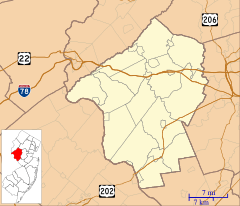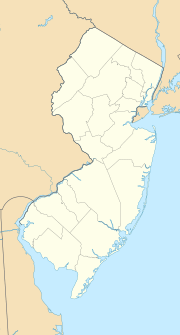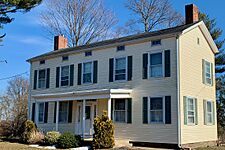Cloverhill, New Jersey facts for kids
Quick facts for kids
Cloverhill, New Jersey
|
|
|---|---|
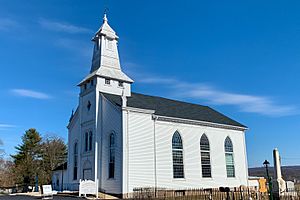
Clover Hill Reformed Church
|
|
| Country | |
| State | |
| County | Hunterdon and Somerset |
| Township | East Amwell, Raritan and Hillsborough |
| Named for | Peter Clover |
| Elevation | 187 ft (57 m) |
| GNIS feature ID | 875522 |
Cloverhill (or Clover Hill) is a small, unincorporated community in New Jersey, USA. It's unique because it's located right where three different areas meet: East Amwell and Raritan townships in Hunterdon County, and Hillsborough Township in Somerset County. A special part of Cloverhill is recognized as a historic district, protecting its old buildings and history.
History of Cloverhill
Early Beginnings in Cloverhill
The story of Cloverhill began in 1683. A man named John Bennett bought a large area of land here. This purchase helped start the community that would later become Cloverhill.
Clover Hill Reformed Church
The Clover Hill Reformed Church was built in 1834. It was originally a Dutch Reformed Church. This church became a central part of the community.
Growing Community in the 1800s
By the late 1800s, Cloverhill had grown quite a bit. It was a busy place with several important buildings.
- There was a hotel where travelers could stay.
- A general store served the community's needs.
- The church continued to be a key gathering spot.
- A blacksmith shop was essential for repairs and tools.
- The community also had its own post office.
How Cloverhill Got Its Name
The community is named after a man named Peter Clover. He was a blacksmith who had his shop right across from the church. His name became the name of this historic place.
Clover Hill Historic District
|
Clover Hill Historic District
|
|
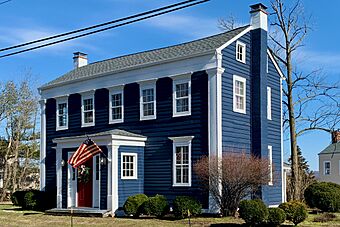
J. B. French House
|
|
| Location | Amwell and Wertsville-Clover Hill Roads |
|---|---|
| Area | 25.6 acres (10.4 ha) |
| Architectural style | Greek Revival, Late Victorian, Gothic Revival |
| NRHP reference No. | 80002492 |
| Significant dates | |
| Added to NRHP | September 29, 1980 |
What is a Historic District?
The Clover Hill Historic District is a special area that protects important old buildings. It covers about 25.6 acres of land. This district includes parts of Amwell and Wertsville-Clover Hill Roads.
Why is it Important?
This district was added to the National Register of Historic Places on September 29, 1980. It's important because of its role in the area's religious history. It also shows how the community was first settled and developed. The district includes 21 buildings that help tell this story.
Key Buildings in the District
Clover Hill Reformed Church Design
The Clover Hill Reformed Church has a unique look. It features short spires, which are pointy towers, on its corners. This design is typical of the Gothic Revival style. The church's steeple, which is a tall tower, had to be replaced in 1885. This happened after a strong wind blew the original one down.
The J. B. French House
The J. B. French House was built in 1873. It shows off the Greek Revival style. This style often includes grand columns and simple, balanced designs.
The E. Bartow Farm / John Cruser House
The E. Bartow Farm, also known as the John Cruser House, was built in three main stages. Construction started around 1840. This house has special windows on its third floor. These are called knee wall windows, which are often found in rooms with sloped ceilings.
 | John T. Biggers |
 | Thomas Blackshear |
 | Mark Bradford |
 | Beverly Buchanan |


